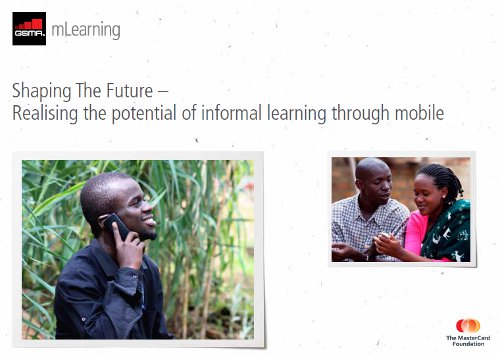Survey: mLearning in Ghana, Uganda, Morocco most effective via voice, SMS
Curious about attitudes toward mLearning in Ghana, Uganda, or Morocco? The GSMA mLearning report “Shaping the Future – Realising the potential of informal learning through mobile” provides more than enough food for thought. The study seeks to understand what the youth want from mobile devices and then focuses on how to deliver educational material in the most effective manner.
That’s right: mLearning isn’t limited only to traditional schooling. What’s more, mLearning is best explored as a supplement to and not a replacement for classroom learning. Classrooms can teach about the world, but the primary function of mLearning (at least according to the researchers) is to impart job skills.
The report – synthesized results of 1,200 surveys – contains four sections: understanding the youth in emerging markets, education and employment, mobile life, and the future of mLearning. Not surprisingly, trends from three different regions of Africa all are in good agreement. Everyone knows of the Internet and most of those who haven’t used the Internet wish to do so in the future. Still, most youth are content using simple mobile features like voice and SMS to participate in mLearning.
Some findings include:
- 21-24% of youth cited cost of handset as greatest barrier to ownership
- In Morocco, 57% of respondents said they had “no need” for a mobile phone
- 28% of Ugandans say family/spouse doesn’t allow mobile ownership
- Mobile phone is cited as the most important asset by 61-85%
- Internet access is not seen as a strong motivator for phone purchase
- Average number of SIMs owned in Ghana is 1.5, Morocco 1.26, Uganda 1.92
- Data services are still rare. Voicemail, SMS, and music were the most-used phone functions
- Mobile money was common in Uganda but not as much in Ghana or Morocco
- 20% of youth in Ghana and Uganda had used mobile Internet service.
- Nearly everyone knew of Facebook and of mobile Internet.
- 70% were interested in downloading music, 35% celebrity news, 28% job hunting, 23% research
- Many still had not used the Internet: 57% in Uganda, 46% in Ghana, 17% in Morocco
- 60% of those who hadn’t used the Internet did say they would like to in the future
- Television, friends/family, and Internet are all considered important means of accessing educational information
- Online courses were marginally popular
- Costs must remain low and programs need to be tailored to simple phones. Only 7% of respondents felt that Internet-based mobile services would be a better mLearning option than voice or SMS.
- Barriers to mLearning: limited features, limited content, screen size, phone usability
Still, better Internet service and costs must exist before the youth in these nations are ready to embrace sophisticated Internet-based mLearning services. As “MNO” from Ghana puts it, “we need to start a market shift and move people away from voice and SMS onto data. People are moving away from wanting a torch on their handset onto wanting Facebook.”













 Twitter
Twitter Facebook
Facebook Pinterest
Pinterest